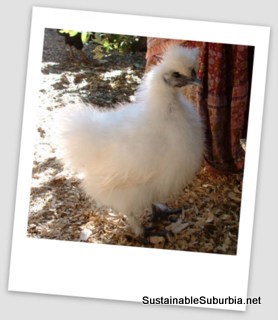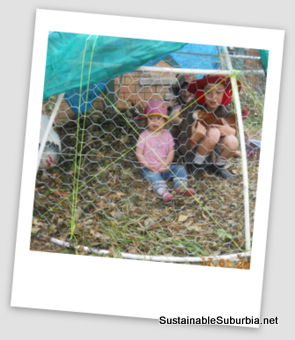Raising organic, backyard chickens is one of the best decisions you can make to live more sustainably. Not only do they eat your vegetable scraps (in addition to a little grain), but they also pick snails and slugs from your garden, give you fabulous manure to add to your compost pile, and even lay eggs for consumption!
Before getting started, check with your local council about any regulations regarding bird keeping. Some councils allow hens but not roosters, while others do not permit the keeping of any birds. Some may also classify bantam chickens as aviary birds, which often means less restrictive regulations.
Determining why you want to raise chickens is vital in order to select the best breed to meet your needs. Do you want fresh eggs to go with your homemade bread and preserves? Or do you want organic broilers that are full of flavour to add to your dinner menu? Or do you simply want a few hens to scratch around the garden and rid it of unwanted pests?
Once this is decided, you can set out to select the breed of chicken that will bring the most benefits to your backyard.
Basically, there are two types of chickens – hybrids and purebreds. Each has their pros and cons so some investigation is needed to determine what is right for you. Hybrid chickens are the most common and are bred for commercial production. They are often less susceptible to disease and are quite easy to source.
Purebred chickens are the old heritage chickens that have been bred down through generations. They are ideal if you want specific traits or have an interest in keeping heritage breeds going.
In addition, another type of chicken is the Bantam chicken. These chickens require very little space, so they are ideal for small backyards. Many larger breeds are bred to Bantam size in order to retain certain traits (like good egg laying). Because of their smaller size, there is not as much meat on them and their eggs are smaller than regular size chickens – but both the meat and the eggs are just as flavourful. You can also source purebred Bantam chickens, which are good for show or make great pets for children because of their docile personalities.
Chickens intended for meat are heavier breeds, making them less flighty. If you are contemplating meat and egg-laying chickens, there are dual-purpose birds that can make good table birds and egg-layers.
It is worth remembering that children become attached to animals fairly easily, so if you intend to raise some chickens for meat, refrain from naming them “Easter” or “Annabelle,” as serving them up featherless on a dinner plate is sure to bring tears.
Buying chooks
The best time to buy your chooks is in the spring when better weather, new grass growth and lots of sunshine are in the near future.
The least expensive way to go is to purchase day-old chicks. While they are a cheap option, they unfortunately come with high mortality rates. Additionally, if you are after egg-layers, very few breeds can be sexed at such a young age, leading you to potentially become the owners of many roosters instead of hens. Finally, hens will not start laying eggs until between five and eight months old, so be prepared to feed and care for them in the meantime.
To sidestep some of these negativities, opt to buy point-of-lay pullets instead. Pullets are young female chickens that are between about eight weeks and one year old. Point-of-lay pullets are around 18 weeks (depending on the breed), and should begin laying eggs within four to six weeks after purchase. Be prepared to pay much more for these birds though as someone has had to feed, care and house these birds until they reach four or five months.
Feeding
Chickens require a diet that is high in nutrients. What you feed them will affect the taste and appearance of the final product. Their diets can be quite diverse and can include worms, grains, clovers, greens, and an array of vegetables. Whatever you decide to offer your feathery friends, make sure that it is always fresh so as to avoid the transfer of mould and bacteria. Because chickens have no teeth, they will need a little grit in their diets in the form of small gravel in order to grind the seeds in their stomachs. Your chooks should always have access to plenty of fresh water.
Shelter

Although chickens do not require much, one thing they will require is good shelter and protection from the elements. There are myriad shelters to decide upon depending on how many chickens you intend to have and the amount of space that you have available.
Mobile chicken coops are fantastic options if you have a little more space and just a few chickens, since moving large coops around can be tricky. They can be quite simple in design and can be moved manually with attached wheels or by pulling with a tractor.
Chicken coops are another great option for providing shelter for your hens. They will need ample light, ventilation and a good feeding set-up. Make sure to select a design that can both keep the chickens warm and provide good air circulation. Because it cannot move, you must be prepared to clean it out often to avoid odour problems.
Raising chickens, whether for eggs, meat, or garden patrol, is a satisfying endeavour sure to deliver many smiles and great satisfaction. Docile breeds can double as fantastic pets and if you opt for egg-layers, letting children collect the eggs each morning is both exciting for them and introduces the many joys of sustainability.
Because chickens can be raised in a variety of spaces, they can be part of even the smallest of backyards given the right breed and coop. Backyard chickens are healthier than their factory counterparts giving a more superior product. Furthermore, they can be a great way to meet your neighbours because for some reason, chickens are great conversation starters. After all, that is how I met my neighbour – he brought eggs over one morning!





There is nothing better than fresh eggs from your own hens!
So true 🙂
There is nothing better than fresh eggs from your own hens!
So true 🙂
I have yet to see any article regarding getting started with raising chickens that has a simple LIST of what items are needed to house, feed, water raise eggs for food, and butcher chickens for meat. I don’t want to read through an entire article pages long: I just want a LIST of those things needed. I have read many articles, and have books and magazines: I need a list of what I need to get started! Thank you!
Hi Carol, thanks for your feedback.
You probably can’t find it because it’s quite variable depending on your situation. But, I’ll put it on my list of things to think about writing!
But, there are places now that will supply everything to get you started – even “rent” you hens for a trial period. Maybe they could help you?
If you look at the list of products on this page: http://www.canberrachooks.com.au/ that should give you a pretty good idea, although that only covers raising chooks for eggs, not anything about butchering them, which is a bit of a separate thing and will need different tools.
Also it doesn’t cover raising them from chicks or eggs, but I would recommend starting out with some pullets, getting some experience with chickens generally before you get to raising them from chicks.
Hope that helps!
I have yet to see any article regarding getting started with raising chickens that has a simple LIST of what items are needed to house, feed, water raise eggs for food, and butcher chickens for meat. I don’t want to read through an entire article pages long: I just want a LIST of those things needed. I have read many articles, and have books and magazines: I need a list of what I need to get started! Thank you!
Hi Carol, thanks for your feedback.
You probably can’t find it because it’s quite variable depending on your situation. But, I’ll put it on my list of things to think about writing!
But, there are places now that will supply everything to get you started – even “rent” you hens for a trial period. Maybe they could help you?
If you look at the list of products on this page: http://www.canberrachooks.com.au/ that should give you a pretty good idea, although that only covers raising chooks for eggs, not anything about butchering them, which is a bit of a separate thing and will need different tools.
Also it doesn’t cover raising them from chicks or eggs, but I would recommend starting out with some pullets, getting some experience with chickens generally before you get to raising them from chicks.
Hope that helps!